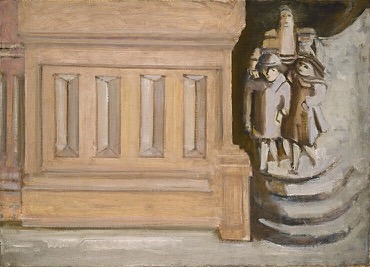ByThePeople

Mark Rothko: Street Scene, (1937)
"Who said I don't need to?"
Marble staircases soft as butter underfoot reveal a modest interior. Modest yet massive, as the stone lends its cold gravitas to this public place. Delicate glass shades gilded fixtures. Our county courthouse was built by public subscription. Individuals pledged personal funds to erect it back when boosterism amounted to expressing personal pride of place, of ownership, and a confidence that this corner of the state really would become something someday, that, however otherwise unlikely, we'd eventually grow into feeling worthy of this space. I'm still working on that last part. Before it became popular to perceive a government created by we, the people, as a nefarious other—a self-revulsion difficult to contemplate—we sought to unite us, however ineptly, and sometimes succeeded, this wedding cake building stands as a monument to hopeful optimism. ©2021 by David A. Schmaltz - all rights reserved
The Muse and I are registering to vote. We wanted to be present, to show up for our transformation back into citizens of this particular location. In Maryland, when we declared residence, I remember anonymously driving to some sprawling complex out in endless suburbs, where I took a number and sat for bureaucratic hours within a crowd of scores of equally disenfranchised citizens. The whole process seemed to lack some blood in its veins and we, the people, could only shuffle through it, results mailed within a few subsequent business days. I left there feeling no prouder. I left there feeling nothing. Here, the hallways bustle. Lawyers in suits and ties wend their way up to the courtroom floor while a small crowd of people stand in the hall outside the county licensing bureau. The sign says "cash or checks only." They do not accept plastic for their services. Car titles and marriage licenses wait in the same line along with us, prospective registered voters. Five or six parties stand ahead of us. The floor features a marble compass, like the center of this world does.
After a half hour, The Muse notices the fine print declaring that voter registrations should go to room 205. We've been waiting at 210. It only takes a minute to determine that no room 205 exists, but 203 features an Elections sign over the door, and it seems empty except for two clerks behind a tall counter and plexiglas. I stick my nose inside and learn that we've arrived. I'm told that I should expect to receive my registration card by mail in a few days, if that's all right. "What if it isn't?" I learn that if we're willing to wait a few minutes, we could leave with paper confirmation that we're back. It's been a long month spent straddling a past and an impending future. I felt more than ready to publicly declare my return. We would wait.
The very best guarantee of voter security must be a cumbersome process. The clerk helping us has not yet mastered how to print registration cards, a process requiring both special card stock and some nudging on the computer. Her colleague has figured it out, though he doesn't remember where the card stock's hidden. It's all light-hearted and human, obviously not infallible, properly scaled. We learn that we're the second couple relocating from Colorado that day, though I cringe to hear us referred to as a "Colorado couple." Association rubs off, however much denied. My precinct will be the elementary school I attended back near the end of The Dark Ages, though it's been replaced with more modern brick since. It's all vote by mail now, like it was in Colorado, so we, the people, never need to closely associate with each other to exercise self-determination. This right, this privilege, this obligation was envisioned ByThePeople. The Muse said after that I did not really need to trim that card out of its form and carry it around in my wallet. Who said I don't need to?


